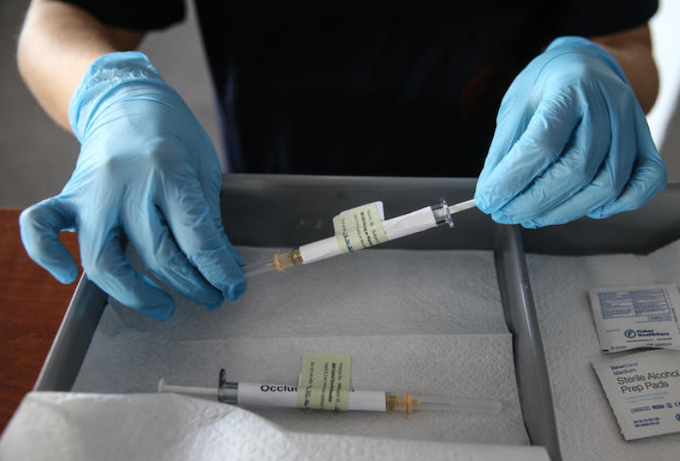
By Te Aorewa Rolleston, RNZ News Te Ao Māori affairs
The National iwi chairs forum has put forward six recommendations to the New Zealand government which they say are a priority for mitigating the risk of covid-19 for Māori and general public.
It comes after a more infectious variant of covid-19 was found in managed isolation, signalling a potentially heightened risk of the virus entering the community.
The vaccination strategy did not include kaumātua and Māori as an at-risk group, but the government should be doing more to discuss vaccination strategies with Māori, the National Iwi Chairs forum said.
The forum’s Pandemic Response Group co-chair, Mike Smith, said it would be a tragedy if there was a failure after all the effort the country has put in.
“We think that these are the right responses at the right time in order to provide a greater level of safeguard for our communities,” he said.
“Kaumātua, kōroua, kuia and other Māori aged over 50 are potentially at risk of covid-19 and have not been identified as one of the high risk groups and we haven’t seen any evidence in the vaccination strategy that they’re included as an at risk group… the government should be entering discussions with Māori to bring the vaccination strategy into line with their obligations to safe guard us.”
Indigenous people are more vulnerable when it comes to contracting the virus and it spreading within the community, the forum said.
Strategy ‘falls short’
Smith said the government’s vaccination strategy fell short of its obligations to Te Tīriti o Waitangi as it did not demonstrate protection, partnership and equality.
The six recommendations included the government applying the pre-departure negative test requirement to all travellers intending to enter New Zealand as soon as possible.
It also recommended capping arrivals at 300 per day or 2100 per week, and, when the number of active cases in MIQ reached 20 to 30 cases, capping the number of entries to a lower level.
“The number of active cases in MIQ are no longer sustainable with world cases trending past 800,000 per day and no sign of slowing down, and the threat from new strains; at current levels, the number of arrivals into New Zealand are over five times higher than those for Queensland which has a similar population,” Smith said.
The forum wants the government to explore the efficacy of testing travellers to New Zealand immediately upon arrival in airports as they disembark; it also wants the vaccine roll-out to be brought forward for implementation as soon as possible and for the government to enter into discussions with Māori to bring the Vaccination Strategy in line with Te Tīriti o Waitangi.
The Pandemic Response Groups say the current vaccination strategy falls short of Ngā Tikanga o te Tīriti o Waitangi on protection, partnership, and equality, which is contradictory to the epidemic-pandemic history of Aotearoa New Zealand which shows that Māori as indigenous peoples are the most vulnerable people in the country.
Its final recommendation is calling for a halt on all plans to establish new international quarantine-free bubbles and immediately review and risk-assess existing and planned group entry arrangements.
Hipkins welcomes iwi advice
In a statement provided to RNZ, Covid-19 Response Minister Chris Hipkins said the Ministry welcomes the advice and feedback of the Iwi Pandemic Response group.
“There are a number of recommendations we have either addressed or are planning to address. In other areas, the government is still undertaking active consideration and the advice of the Iwi Pandemic Response Group will be taken into account,” he said.
“In relation to halting travel bubbles and the arrival of groups (such as RSE workers or sports teams), the Ministry of Health is confident its current stringent border processes including border testing, managed isolation and quarantine, infection prevention measures are sufficient to continue to protecting New Zealanders from the new Covid-19 variants.
“However, we are not complacent about this. We continue to review the international evidence and make adjustments as necessary. You will have seen that we recently introduced compulsory pre-departure testing and day 0/1 testing in managed isolation (in addition to the existing testing). These progressively take effect from 15th January.”
“As things currently stand, we expect to start vaccinating those most at risk from the second quarter of 2021, aiming for April.
“Regarding our national Covid-19 vaccination strategy, the strategy has a strong Treaty-based approach which prioritises engagement and health outcomes for Māori.
“This approach also acknowledges the key risks this virus represents to different segments of the population, including the need to address equity concerns in health outcomes for Māori and Pacific communities.
Independent, practical advice
“The Ministry also continues to work closely with the Immunisation Implementation Advisory Group, which has strong Māori representation and provides independent, practical advice and direction to the Ministry of Health on the planning and implementation of the Covid-19 immunisation campaign.
“As we get increasingly closer to a potential roll-out we are looking to increase engagement activities with key partners and stakeholders, and welcome further dialogue with the Iwi Pandemic Response group.
“Iwi and Māori engagement will be critical to the continued successful implementation of the Government’s Covid-19 elimination strategy, including the national vaccination programme currently being planned.”
This article is republished under a community partnership agreement with RNZ.













































